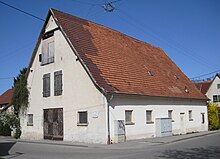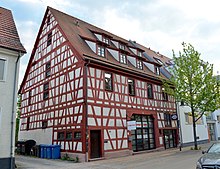Farrenstall


As Farrenstall (in other areas also "Fasel stable" or "Hägestall") is referred to in the space of Baden-Wuerttemberg , a building where the municipally owned sires was operated.
In many German-speaking areas, including the Kingdom of Württemberg , the obligation to keep father animals was imposed on the communities as early as the first half of the 19th century. In some cases, this obligation was fulfilled by remunerating individual farmers for keeping sire animals, but in the course of time it was mostly accepted to build a community-owned building for keeping sire animals. Although with Section 17 of the Animal Breeding Implementation Ordinance (TierZDVO), the municipal duty to keep father animals ceased to exist until January 1, 2000, artificial insemination had been gaining ground since the 1960s , so that most bullocks lost their function and were given up before 1980 .
The vacant buildings, which were mostly part of the community tradition and were often under monument protection , were often rebuilt and used for other purposes, whereby the name "Farrenstall" was retained. So you can currently find community or youth centers, restaurants and club houses in many communities, the name of which still indicates this original use of the building.
The name Farrenstall is derived from the Swabian word "Farren", which means a sexually mature male domestic cattle .